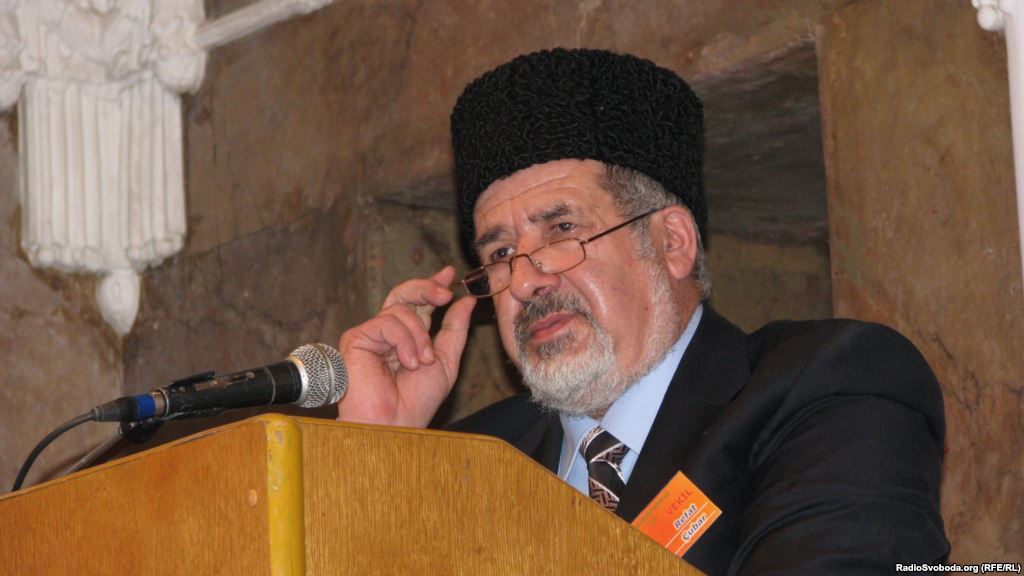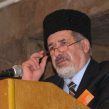
Crimean Tatar Mejlis Elects New Chairperson as Mustafa Cemilev Steps Down
Publication: Eurasia Daily Monitor Volume: 10 Issue: 204
By:

On October 26–27, the sixth convocation of the Crimean Tatar Qurultay (Crimean Tatar National Congress) took place in Simferopol, Crimea, and elected a new chairperson for the Crimean Tatar Mejlis (de facto, 33-member quasi governing assembly of Crimean Tatars). After the final count of the secret ballots, it became clear that the majority of the delegates voted for Refat Chubarov as the new leader of the Mejlis. Chubarov received 126 votes and the runner-up, Remzi Ilyasov, obtained 112 votes (https://qha.com.ua/chubarov-stal-glavoi-meljlisa-131059.html).
For Crimean Tatars, this was a historical moment. Since the establishment of the Mejlis in 1991, its chairperson has been Mustafa Cemilev, who was elected unanimously for the position in each one of the Qurultay elections that takes place every five years. Mustafa Cemilev is a former dissident and a legendary leader for Crimean Tatars. During the Soviet era, he was imprisoned six separate times in 1966, 1970, 1974, 1976, 1978, and in 1983 for his active participation in the Crimean Tatar National Movement in exile. All together he spent approximately 20 years in jails, hard labor camps and gulags. His ten-month hunger strike, which he survived through force feedings that left his vocal cords somewhat damaged, attracted global attention (https://atr.ua/#!home&video=2013-11-09-13-42-34-6178569). In 1998, he received the United Nations Refugee Agency’s (UNHCR) Nansen Award for his outstanding commitment to the right of return of Crimean Tatars to their homeland: Crimea, Ukraine (https://www.unhcr.org/pages/49c3646c467-page3.html).
For many Crimean Tatars, Mustafa Cemilev was synonymous with the Mejlis. Because his absence from the chairmanship was unthinkable, a large number of Crimean Tatars from Crimea as well as the diaspora sent Cemilev their requests before the Qurultay and asked him to stay one more term as the chairperson. However, Cemilev firmly declined these offers in his opening speech to the Qurultay on October 26, and told his audience that, after 22 years of service, he was leaving the Mejlis in other capable hands. Stressing the importance of “national discipline,” Cemilev recommended that the new leadership work closely for the unity of the Crimean Tatar people (https://15minut.org/article/dzhemilev-podtverdil-chto-uhodit-s-dolzhnosti-glavy-medzhlisa-2013-10-26-11-38).
The newly elected chairperson of the Mejlis, Refat Chubarov, who previously served as the body’s first deputy chairman, is not a stranger to Crimean and Ukrainian politics (https://qha.com.ua/kirimoglu-nun-halefi-belirlendi-refat-cubarov-129831tr.html). This seasoned politician is currently a member of the Crimean parliament and he has served as a deputy of the Ukrainian national parliament (Verkhovna Rada) in 1998–2002, 2002–2006, and 2006–2007 (https://www.radiosvoboda.org/content/article/25149669.html).
The Qurultay elections received attention from several Ukrainian politicians. On October 26, the chairman of the Verkhovna Rada, Volodymyr Rybak, sent a text to the Qurultay delegates and wished them a constructive and fruitful assembly that would bring about informed and effective decisions. In his text, Rybak referred to the Qurultay as the “National Congress of Crimean Tatars” and identified it as a system of “supreme national representation that plays an important role in addressing the pressing issues of social and political situation in Ukraine as well as in the Autonomous Republic of Crimea, in addition to ensuring human rights and security of the Crimean Tatar people” (https://15minut.org/article/ukrainskij-spiker-priznal-kurultaj-vysshim-i-polnomochnym-organom-krymskih-tata).
After the elections to the Mejlis, one of the first congratulatory notes sent to Chubarov was from Arseniy Yatseniuk, one of the leaders of the Batkivshchina party, and the current leader of the parliamentary faction “Fatherland.” In his message, Yatseniuk stated that his party valued its long-term cooperation with the Crimean Tatars and promised Batkivshchina’s support for the Mejlis regarding the restoration of human rights and justice (https://qha.com.ua/milletvekilleri-ve-diplomatlar-cubarov-u-kutluyor-129898tr.html).
One of the most notable letters to the Crimean Tatar leadership came from the imprisoned former prime minister, Yulia Tymoshenko, who is serving a seven-year sentence in Kharkiv. In her letter, Tymoshenko expressed her solidarity with the Crimean Tatar people and condemned the recent mosque attacks that occurred across Crimea (see EDM, October 23) as well as other inter-ethnic hate crimes. Furthermore, she asserted that Ukraine should restore the rights of the Crimean Tatars in their motherland that were violated by Joseph Stalin’s despotic regime. She also wrote that her political stance was to work with Crimean Tatars jointly for the betterment of Ukraine and its entry into a family of free European nations (https://qha.com.ua/tymoshenko-we-need-to-restore-the-rights-of-crimean-tatars-129767en.html).
Crimea is a strategically important region in Ukraine, where the majority of the population is made up of ethnic Russians who support President Viktor Yanukovych vehemently. Crimean Tatars on the other hand, have supported Western-oriented Ukrainian leaders who favor the country’s inclusion in Euro-Atlantic structures. During the 2004 presidential elections, while Yanukovych was backed by the pro-Russian majority in Crimea, Crimean Tatars overwhelmingly voted for Viktor Yushchenko. Throughout the campaign period, the Crimean Tatar returnees walked around Crimean streets carrying orange flags and wearing orange scarves, hats, and t-shirts to show their support for Yushchenko (Author’s personal observations, 2004). In fact, on November 30, 2004 (after the disputed second round of elections), Mustafa Cemilev gave a speech to the crowd in Kyiv’s Independence Square (Maidan Nezalezhnosti) urging all Ukrainian citizens to vote for Yushchenko (https://www.usak.org.tr/dosyalar/dergi/exjqkN9bvedgM8ygXrv13hKm8Tzb8N.pdf).
Similarly, during the second round of the 2010 presidential elections, the Mejlis called on Crimean Tatars to collectively vote for Yulia Tymoshenko (https://ru.kyivpost.com/content/politics/mejlis-calls-on-crimean-tatars-to-vote-for-tymoshe-57816.html), arguing that she would improve human rights and democracy in Ukraine (https://www.tymoshenko.ua/en/article/8wmo62es). Consequently, in the 2012 parliamentary elections in Ukraine, Cemilev joined the All-Ukrainian Union “Fatherland,” the second biggest political party in Ukraine and was re-elected to the Ukrainian parliament, where he currently serves as the only ethnic Crimean Tatar deputy (since 1998) (https://www.day.kiev.ua/en/article/day-after-day/mustafa-dzhemiliov-number-12-list-united-opposition-fatherland).
Notably, the Yanukovych government does not cooperate with the Mejlis and does not even try to construct a dialogue with its leadership. Anatoly Mogilev, the chairperson of the Crimean Council of Ministers, does not recognize the Mejlis and calls it an “illegal organization” (see EDM, October 8). As long as these attitudes persist, the Crimean Tatars, a genuinely pro-Ukrainian political force on the peninsula, will continue to struggle against systemic political opposition and rejection of their rights.




